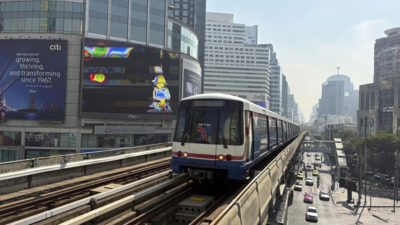Faced with soaring levels of air pollution, Thailand has introduced a bold measure to ease the crisis in its capital, Bangkok. Public transport, including buses and the city’s Skytrain and metro systems, will be free for a week starting Saturday.
Authorities hope this initiative will reduce the number of private vehicles on the road, a significant contributor to the hazardous air quality.
The Thai capital is no stranger to air pollution, but this year’s levels have been particularly alarming. On Friday, over 350 schools were closed across 31 districts due to deteriorating air quality.
The level of PM2.5 pollutants, harmful microparticles that can enter the bloodstream through the lungs, reached 108 micrograms per cubic meter, far exceeding the World Health Organization’s (WHO) recommended limit of 15.
Bangkok is ranked as the world’s 14th most polluted city on Saturday, according to IQAir, a Swiss air quality monitoring service.
The worsening conditions have caused respiratory problems among residents, with many reporting burning sensations in their throats. The government has also implemented a voluntary work-from-home scheme and restricted heavy vehicles in the city to mitigate the crisis.
The pollution in Bangkok has been attributed to several factors, including vehicle and industrial emissions, construction dust, and seasonal agricultural burning. The interior ministry has banned crop stubble burning, a common practice in northern Thailand, threatening legal action against violators.
Prime Minister Paetongtarn Shinawatra, who expressed her concern over the issue in a social media post, emphasised her government’s commitment to tackling pollution through both short- and long-term measures. She also called for regional cooperation and stricter controls on construction activities.
Bangkok’s struggle mirrors the challenges faced by other cities in Southeast Asia. Ho Chi Minh City in Vietnam and Phnom Penh in Cambodia also ranked high on IQAir’s most-polluted cities list this week, with air quality reaching critical levels. Beyond the region, cities in Pakistan and India have also recently closed schools due to hazardous air conditions.
According to Unicef, climate shocks worsened by global warming are exacerbating air pollution worldwide, affecting millions of children and causing long-term health consequences.






